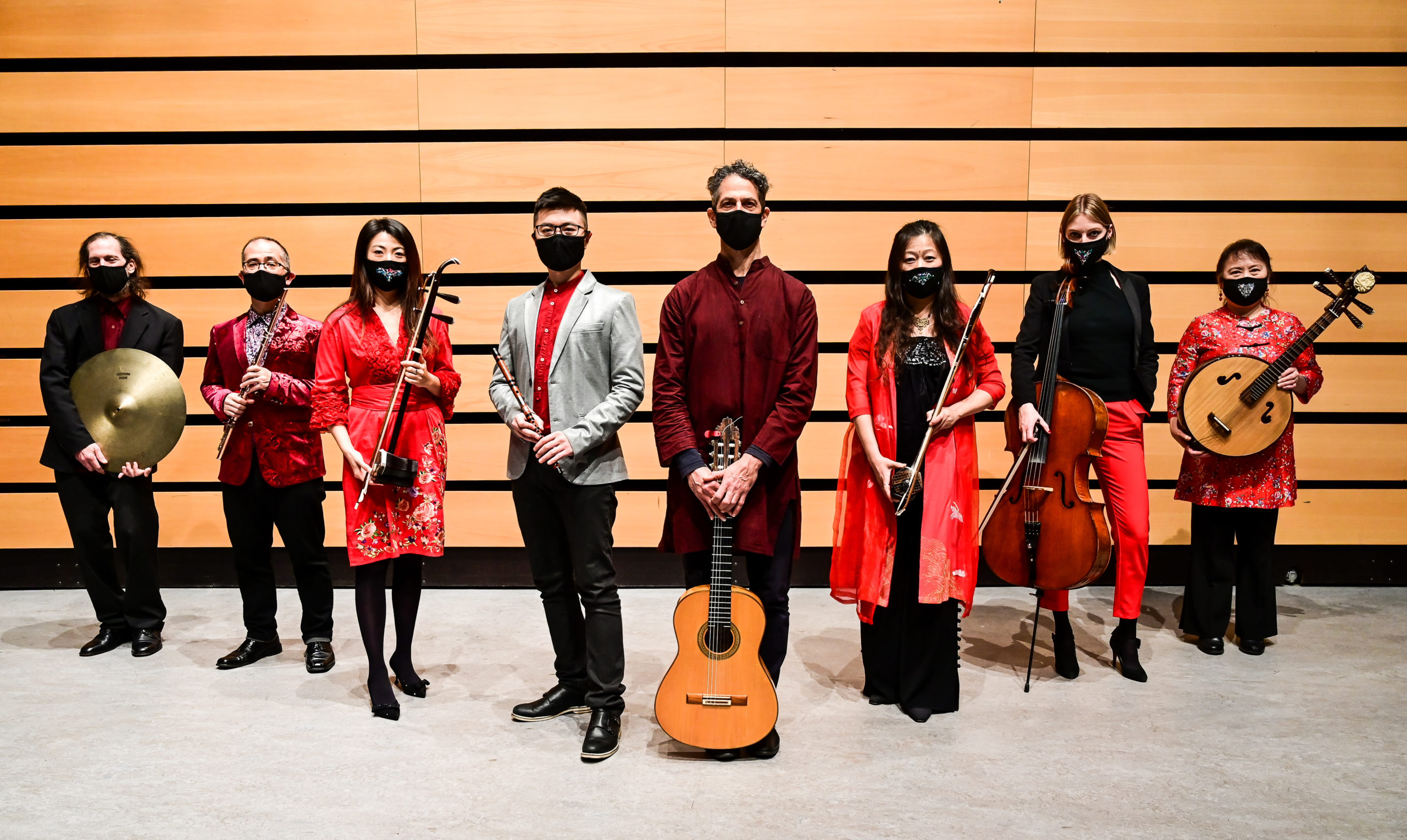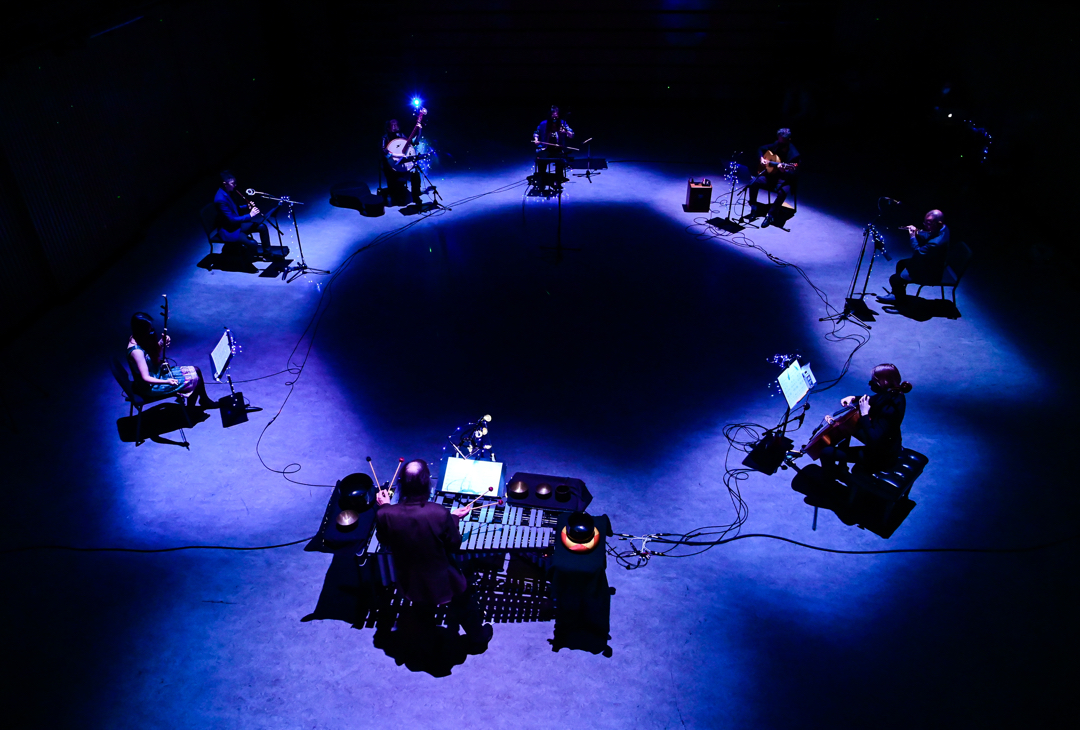Sound of Dragon Ensemble 龍吟滄海樂團 (Vancouver)

New Releases
- Mark Ferris – violin
- Jonathan Girard – conductor
Lan Tung – producer
Alistair Eagle – Videography
Marc L’Esperance – audio engineer
Recorded at the Annex Theatre, Vancouver, 2021
Ocean of Tears (2020/2021) – Moshe Denburg (Vancouver) 12’30”
for dizi, flute, erhu 1, gaohu or violin, guitar, ruan, cello, percussion
《淚海》- 莫協.丹伯格,笛子、長笛、吉他、二胡、高胡或小提琴、阮、大提琴、打擊
The Ocean of Tears is meant to be a sonic picture of sadness and of reflection. It was embarked upon after a commission was secured from the Canada Council for the Arts. Maestro Chih-Sheng Chen of the Little Giant Chinese Chamber Orchestra of Taiwan, and Lan Tung, leader of the Sound of Dragon Ensemble (Vancouver, Canada), suggested that I compose a work in two variations – one for Maesto Chen’s Chinese Chamber Orchestra, and a second arrangement for the Sound of Dragon Ensemble. Providentially, the commission was secured just before the COVID19 pandemic was declared, in March of 2020, so I was gainfully at work during the months of social distancing in 2020!
The challenge I presented myself was to evoke a sense of sadness utilizing the Chinese instrumentarium. I have always found Chinese instruments – not all but overall – to be bright in timbre, evoking almost a celebratory sound. Feelings of sadness, to my ears, require somewhat darker timbres. The Ocean of Tears tries to utilize melodies and harmonies that accord with this more sombre mood.
I tried to reflect upon the sadness in our world today, partly due to the pandemic, but also due to changing political and social configurations which seem to be making us forget our connectedness, and in fact to emphasize our separateness. It is only when we share in the consciousness of the sadness that all human beings are heir to, that we are able to overcome disunity. So, as with much of music, and indeed with art in general, The Ocean of Tears is an attempt to take a step towards this much needed awareness of our common humanity.
Oriole – Lan Tung (2016) – Lan Tung 董籃作曲
Oriole transforms a 1940s Chinese pop song and pays tribute to Shakti, the highly influential Indian fusion band led by John McLaughlin and Zakir Hussain in the 70s. The lyrical vocal line is contrasted with exciting fast instrumental melodies, and it showcases the ensemble members’ improvisational skills.
曲調源自1948年周璇主演並演唱的電影主題曲花外流鶯,樂曲的發展則深受印度70年代著名樂隊Shakti的影響,悠揚的人聲與節奏強烈的器樂部分形成鮮明的對比。
Previous Releases
- Mark Ferris – violin
Foreign Oceans《奇幻海洋》 composed by Jordan Nobles 作曲
Nobles’ “Foreign Oceans” depicts an imagined underwater world. The vibraphone, guitar, and daruan are the ocean currents, flowing back and forth, creating rolling waves and tidal motion. The other instruments are the creatures of the sea, swimming freely within their harmonic sea, in the deep waters, swirling currents, and tide pools. All of the musicians are separated, spatialized around the performance space and coordinated by stopwatches.
Lan Tung – producer
Dejan Radovanovic – Videography & Director
Marc L’Esperance – audio engineer
Recorded at the Annex Theatre, Vancouver, 2020
Water to Fire – improvisation by the Sound of Dragon Ensemble
On July 30, 2021, the Sound of Dragon Ensemble had its first concert with live audience since the pandemic started in March 2020. This was also the first concert with live audience at the Annex since the closure of theatres in the city. The concert has two themes: Water & Fire. This improvisation served as the transition between the two themes.
Lan Tung – producer
Alistair Eagle – Videography
Marc L’Esperance – audio engineer
Recorded at the Annex Theatre, Vancouver, 2021
The next three videos are selected from the ensemble’s collaboration with Melody of China, which included this concert at the Western Front, Vancouver, on May 30, 2019 and the appearance at the San Francisco International Arts Festival on June 1, 2019. conductor Chih Sheng Chen
Timekeepers《計時》(2019) – Dorothy Chang 張彥芸
Timekeepers is a lighthearted and quirky piece that plays with rhythmic pulse. Various combinations of instruments take turns laying down a rhythmic grid that is then distorted, interrupted or layered with other material that either complements or conflicts. The result is a constantly-changing landscape of patterns and pulse, coloured by whimsical elements that include microtonal detuning, zipping noises, scrapes and pops.
《計時》以輕快多變的節奏展現一種律動,其間不同的樂器組合輪番出場,構成一個嚴密的節奏矩陣。這個矩陣又不斷的被其他或是互補或是衝突的素材扭曲、干擾、重疊。這些素材包括微分音的使用,以及各種噪音、樂音的轉換,為這個以節奏勾勒出的圖形帶來不同的色彩與不斷的變化。
Shan Ju Qiu Ming《山居秋暝》(2017) – Mark Armanini 馬克.阿瑪尼尼 lyrics by Wong Wei 王維 (approx. 692-761 AD)
Shan Ju Qiu Ming (An Autumn Evening in the Mountains) In the mountains, the rain has just stopped The cool air declares the arrival of autumn The bright moonlight shines on the pine trees The clear spring flows over the rocks There are voices coming from the bamboo forest They are the women who have returned from the river after doing laundry The lotuses are waving their leaves Disturbed by the fisherman who are ready to depart Although the spring grasses have died away The autumn scenery is full of beauty Those who are busy pursuing fame, take a moment and stay for a while Guo Xiang Ji Si (Passing the Incense Temple) Unknowing on a journey Deep into the cloudy peaks Alone among ancient trees A distant bell resounds Down a steep rocky path The mountain stream tumbles Through a dime pine glade In the fading light of day Before rounding a bend It settles in a pool of quiet Where the peace filled mind At last stills the lashing dragon
山居秋暝 – 王維 空山新雨後,天氣晚來秋, 明月松間照,清泉石上流; 竹喧歸浣女,蓮動下漁舟, 隨意春芳歇,王孫自可留。 過香積寺- 王維 不知香積寺,數裡入雲峰。 古木無人徑,深山何處鐘。 泉聲咽危石,日色冷青松。 薄暮空潭曲,安禪制毒龍。
Migrant Voices《聲之旅》(2019) – Itamar Erez 伊特瑪.以芮斯
I remember reading Italo Calvino’s (1923-1985) fantastic book “Invisible Cities” (1972) many years ago. It is an imagined set of conversations between the famous traveler, Marco Polo, and the emperor of the 13th century Mongolian empire, Kublai Khan. Each chapter of the book is a prose poem, describing in amazing detail an imaginary city that Marco Polo ”discovered” in his travels, and I remember being deeply inspired by it as a young person. In a similar way perhaps, the music of “Migrant Voices” is a kind of a “discovered” folk song, from an imaginary city, country or culture. Based on a 9/8 + 7/8 time signature, it definitely has elements taken from certain Balkan/Greek music, Turkish or Armenian. Not sure, to tell you the truth, exactly why and how- it just came to me one day as if a voice whispered it in my ear.
出生於古巴、成長於義大利的近代作家 Italo Calvino 的著名小說「隱形的城市」為此曲的靈感來源。作者想像著馬可波羅遇見13世紀蒙古大汗,對他鉅細靡遺的描述了一個個遊歷過的城市,但是書中描述的是作者想像中的虛擬城市。同樣的,作曲家透過自己的想像,創作出一個虛擬國度裡的音樂,富有巴爾幹半島、希臘、土耳其等地色彩,動人的旋律建構在9拍子與7拍子節奏的交替進行中。
Ornamental《裝飾》– John Oliver
Nicole Ge Li 李歌 – erhu 二胡 & John Oliver – guitar 吉他
Recorded during the Sound of Dragon Ensemble’s 2019 debut China Tour in Ping Ding Shan, Henan, China 錄製於2019年龍吟滄海樂團的首度中國巡演,地點河南平頂山市
“I originally wrote Ornamental for erhu and guitar, though the erhu part can be
played on any melodic instrument with the same range (lowest note middle-D). The
musical material is derived from the movement ‘Green’ from my guitar quartet
PRISMOPHONY. The piece begins with a kind of baroque turn and the entire ethos
of the work is inspired by the notion of ornamental music”. – Oliver
龍吟滄海協會於2013年登記為加拿大BC省的非謀利音樂機構,透過舉辦音樂節、音樂會、工作坊、講座等活動,宣揚及保存華裔移民原生地的傳統音樂,同時鼓勵不同族裔的音樂家交流合作,創新發展融合東西方特點的新樂種,打破民族、地域、音樂類別的界限, 重新定義加拿大特色的華裔音樂,展現溫哥華音樂圈的多元與活力。
為進一步推動其「承襲傳統、追求創新」的理念,龍吟滄海協會於2015年籌組龍吟滄海樂團,按傳統絲竹樂的方式,以弓弦樂器、彈撥樂器、吹管樂器、打擊樂器組成。不同的是,龍吟滄海樂團的編制涵蓋了東、西方樂器,包括二胡、大提琴、阮、吉他、竹笛、長笛、各式打擊樂器。
龍吟滄海樂團的另一個使命,在促進溫哥華與加拿大其他城市,以及溫哥華與國外的音樂團體的交流,例如與台灣小巨人絲竹樂團(2018年)、多倫多室內中樂團(2018年)、舊金山漢聲樂團(2019年)的合作。2019年秋季亞洲巡迴包括新加坡及多個中國城市。
溫哥華喬治亞週報形容龍吟滄海樂團的音樂,兼具「 融合一致的整體性及文化碰撞帶來的異域風情」。樂團集結了大溫地區一群技巧精湛的音樂家, 共同探索跨文化的音樂領域,並提供作曲家、演奏家們創意實現的平台。樂團2015年首次的徵曲,即在國際上受到熱烈的迴響,收到33首來自13個國家作曲家的作品。此外,樂團亦積極委託當代作曲家譜寫新作。目前樂團的保留曲目有加拿大、台灣、中國、美國、義大利、英國作曲家的作品。
The Sound of Dragon Ensemble 龍吟滄海樂團 (musicians’ bios)
Nicole Ge Li 李歌 – gaohu 高胡, erhu 二胡, zhonghu 中胡
Lan Tung 董籃 – erhu 二胡 & vocal 人聲
Mark McGregor – flutes 長笛
Charlie Lui 呂畇初 – dizi/Chinese flutes 笛子, xiao
Marina Hasselberg – cello 大提琴
Itamar Erez – guitar 吉他
Zhimin Yu 于志敏 – zhongruan 中阮 & daruan 大阮
Jonathan Bernard – percussion 打擊樂
“A showcase for the exciting, diverse directions being taken by both local and global composers and players working in the Chinese and western musical traditions” – Vancouver Sun
“a unified yet exotic sound” – Georgia Straight, 2017
The Sound of Dragon Ensemble is dedicated to creating/presenting new works for the combination of Chinese and western instruments and presenting contemporary music of Chinese roots/influences to the world stage. Established in 2015 and debuted at the 2016 Sound of Dragon Music Festival, the Sound of Dragon Ensemble brings together some of the most skillful Vancouver musicians: Lan Tung (erhu & voice), Nicole Li (erhu), Marina Hasselberg (cell), Charlie Lui (dizi), Mark McGregor (flute), Itamar Erez (guitar), Zhimin Yu (ruan), and Jonathan Bernard (percussion). This instrumentation has been carefully selected by pairing Chinese and western instruments in the families of bowed strings, plucked strings, and winds, completed by a collection of percussion instruments from both the east and the west.
The Sound of Dragon Ensemble provides the platform to showcase new works and to create opportunities to collaborate and develop. The ensemble is especially interested in the contemporary development of “Canadian Chinese music”, cultivated in our multicultural environment. The ensemble’s repertoire represents original Canadian intercultural art music and breaks down genre boundaries, crossing over Chinese traditions, contemporary music, world fusion, and improvisation. The ensemble has commissioned/premiered/performed music from Canadian composers Mark Armanini, Dorothy Chang, Jordan Nobles, Farshid Samandari, Alice Ho, Itamar Erez, Moshe Denburg, Lan Tung, John Oliver, Adam Hill, Nova Pon, Ali Razmi, Tony Leung, and Bruce Bai. Through call-for-scores, the Sound of Dragon Ensemble has received scores from composers in 13 countries. It has premiered works by Canadian, US, Taiwanese, Chinese, Italian, and UK composers.
The Sound of Dragon Ensemble has given a number of sold-out-concerts, including the collaboration with dancer Dong Mei (2017), the Toronto Chinese Orchestra Chamber Players (2018 Sound of Dragon Music Festival), and Melody of China (2019). The collaboration with Melody of China marked the first time two professional ensembles of Chinese roots from across the US/Canada border have come to work together. Internationally, the ensemble has appeared at the 2019 San Francisco International Arts Festival, 2019 Ding Yi Chinese Chamber Music Festival in Singapore, and Henan Chinese Medicine University and Ping Ding Shan Cultural Centre in China. In a very short time, the ensemble has grown to be a strong voice of contemporary cross-cultural music with enthusiastic support from the music community and the audiences.
In addition to concerts, the ensemble gives educational workshops to composers interested in writing for its instruments and holds reading sessions of new works. The ensemble promotes the awareness/appreciation of Canadian intercultural music-making rooted in ongoing collaboration between artists from distinct cultures/traditions.

